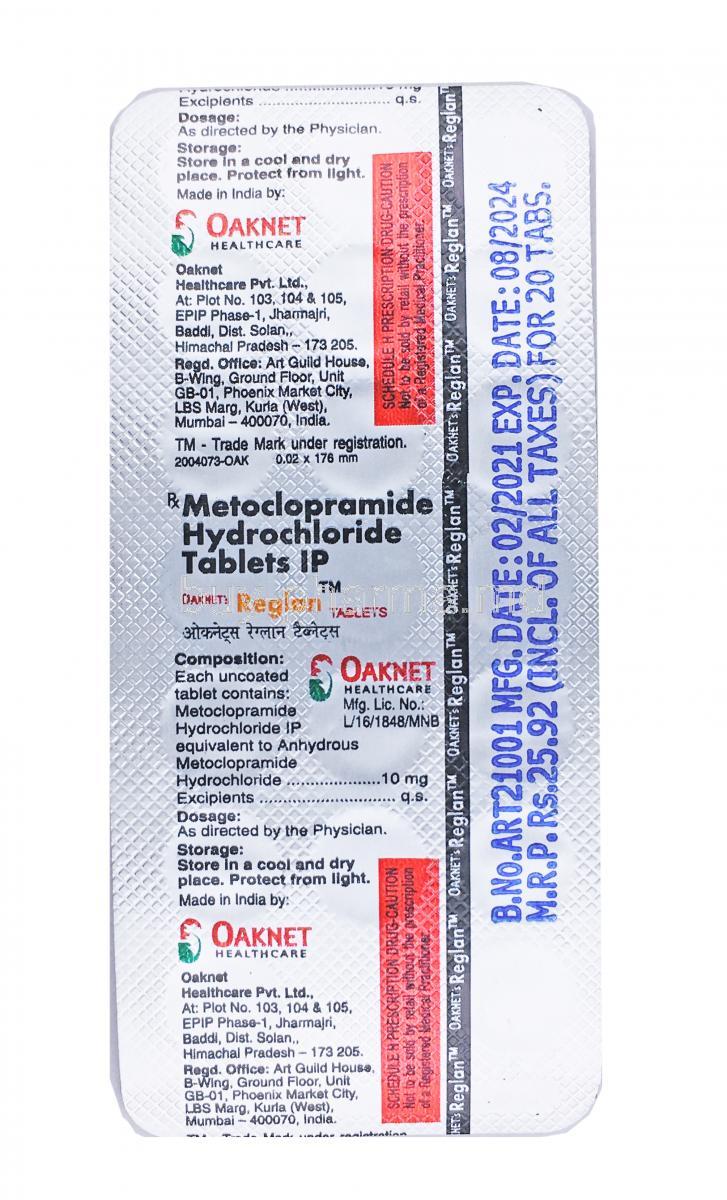Metoclopramide
I. Introduction
Metoclopramide is considered a medication for treating gastrointestinal issues and is known for its effectiveness in speeding up stomach emptying and relieving symptoms of nausea and vomiting. Since its introduction in the 20th century, Metoclopramide has been extensively studied in clinical settings, leading to its approval and widespread use in various medical fields. Its importance in medicine cannot be overstated, especially in treating conditions like gastroesophageal reflux disease (GERD) and diabetic gastroparesis, highlighting its role in improving patients' quality of life.
II. Composition
Metoclopramide chemical makeup allows it to act as a dopamine receptor blocker with effects. The composition of Metoclopramide consists of the drug ingredient and other components that help maintain the effectiveness and absorption of the drug. Metoclopramide is offered in tablets, liquid solutions, and injections to cater to a range of patient requirements and choices.

III. How It Works
Metoclopramide works by blocking dopamine receptors in the system, which helps improve movement and speed up stomach emptying. After taking it, the drug is absorbed and travels throughout the body, mainly processed in the liver and eventually eliminated through the kidneys. These actions create a coordinated pharmacokinetic process. The combined effects of its mechanism of action. How it moves through the body results in valuable therapeutic outcomes, especially in reducing nausea and promoting digestive functions.
IV. Uses
Metoclopramide is used to increase muscle contractions in the upper digestive tract, which speeds up stomach emptying into the intestines. It is used orally for 4 to 12 weeks to treat heartburn caused by gastroesophageal reflux in people who have not found relief with other medications. It is also used to treat gastroparesis (slow stomach emptying) in people with diabetes, which can cause heartburn and stomach discomfort after meals. Additionally, metoclopramide injection is used to treat severe diabetic gastroparesis and to prevent nausea and vomiting caused by chemotherapy or surgery, or to aid in certain medical procedures involving the stomach or intestines1.
V. Dosage and Administration
Dosage Recommendations for Adults: The dosage plan for Metoclopramide is carefully tailored to each individual, considering the specific health condition being addressed and how the patient responds to treatment.
Adjustments in Dosage for Specific Groups: Special attention is given to populations like the elderly and individuals with kidney or liver issues to ensure effective treatment outcomes with minimal risks involved.
Elderly Individuals Kidney Issues Liver Problems Administration Methods and Techniques: The flexibility in administering Metoclopramide, whether through intake subcutaneous injection or intravenous delivery, allows for its incorporation into various treatment approaches.
VI. Side Effects
Typical Adverse Reactions: Although usually well accepted, certain individuals might encounter symptoms like queasiness, tiredness, and head discomfort, which are generally brief and controllable.
Severe Adverse Effects: In instances, Metoclopramide can lead to grave side effects such as tardive dyskinesia, neuroleptic malignant syndrome, and irregular heart rhythms, requiring careful observation and prompt action.

VII. Important Precautions
Before starting treatment with Metoclopramide, it is important to review the patient's medical history and screen for any potential risk factors. This process helps in identifying individuals who may face risks when taking the medication. Regular monitoring is essential to evaluate the effectiveness of the drug and catch any effects early on during treatment. This includes keeping up with follow-up appointments and, if needed, conducting laboratory tests to ensure the patient well being. In case any side effects occur, it is crucial to have a plan in place for managing them. This could involve adjusting the dosage, providing relief, or even stopping the use of Metoclopramide if necessary.
VIII. Interaction
When taking Metoclopramide it's important to be aware of interactions with other medications. Before prescribing Metoclopramide, it's necessary to review the patient's current medication list.
- Using Metoclopramide alongside antagonists can enhance effects or lead to adverse reactions.
- Additionally, combining it with alcohol or CNS depressants can increase effects, so caution is advised.
Certain foods may affect how Metoclopramide is absorbed or its effectiveness so patients should follow dietary guidelines.
For individuals with health conditions, using Metoclopramide may involve additional risks and require adjustments in treatment approaches.
IX. Warnings and Contraindications
Metoclopramide should not be used in patients with conditions like pheochromocytoma, mechanical bowel obstruction, or known allergy to the drug to prevent any harm. There is a black box warning from the FDA about the risks associated with long-term use of Metoclopramide, which can lead to dyskinesia. It highlights the importance of following recommended treatment durations.

X. Careful Administration
- When it comes to the elderly Metoclopramide should be given carefully with doses adjusted and side effects closely watched due to their risk of negative reactions.
- For women and nursing mothers, Metoclopramide is classified as FDA pregnancy category B, meaning the benefits and risks for both mother and baby should be thoroughly considered. Safety during breastfeeding is also crucial, often suggesting an approach.
- As for children, using Metoclopramide requires a customized approach in terms of dosage based on age and careful monitoring for any side effects.
XI. Overdose
Signs of Overdose: It's crucial to be able to spot the signs of an overdose. These could consist of feeling sleepy being confused and experiencing movements among other things.
Immediate Steps and Care: If an overdose occurs, seeking medical help is essential. Treatment may include actions and addressing symptoms to lessen the impact.
Ways to Prevent: Teaching patients about the proper dosage and storage of Metoclopramide can greatly lower the chances of unintentional overdosing.
XII. Handling and Storage
Storing Metoclopramide correctly is crucial to preserve its effectiveness and prolong its shelf life. This usually means storing the medication at room temperature in a place shielded from light and moisture. Taking care when handling Metoclopramide, such as wearing gloves when giving the form, helps reduce the chance of skin contact and possible negative reactions. Following disposal guidelines for Metoclopramide as outlined in local regulations is essential to avoid accidental exposure or harm to the environment.


















